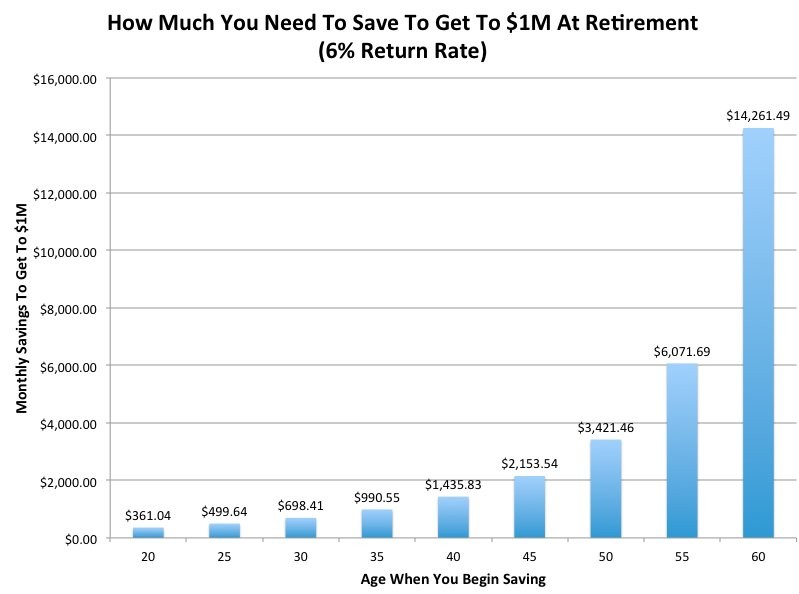Why Save So Much in Our Retirement Accounts Retire By 40
Post on: 16 Март, 2015 No Comment

This is the follow up to the previous blog post – How to save $50,000 per year in your tax advantaged accounts. Is it really a good idea to save so much in our retirement accounts? Should we cut back a bit and invest more in our after-tax account? One downside of saving over $50k/year in our tax advantaged accounts is that we aren’t able to add to our dividend portfolio much. This could be a problem for early retirees like us because we will need to access those retirement accounts before we’re 59 1/2. I don’t want to pay the 10% early distribution penalty. Who does?
Of course, there are great benefits to saving in the retirement accounts.
- Save on tax now – We don’t have to pay tax on the money invested in the 401k plans until we make a withdrawal. I’m pretty sure we’ll be in a lower tax bracket when we both fully retire so we will pay less tax overall.
- Save on tax later – The Roth IRA is great because you don’t have to pay any tax on the earning when you make a qualified withdrawal. Why pay tax when you don’t have to?
- Automated – The saving is mostly automated so we don’t have to think much about it. If you think too much about it, you’ll come to the conclusion that spending money now is better.
- Access – The retirement accounts are not as easy to access as the after tax account. The 10% early distribution penalty will make you hesitate to take the money out. Hopefully, you’ll leave those accounts alone until you’re fully retired.
Early Withdrawal
There are a few ways to access your retirement saving early without having to pay the 10% early distribution penalty.
- Early 401k withdrawal If you leave your job the year you turn 55 or older, then you can start making withdrawals without having to pay the 10% penalty. This is a nice side benefit of the 401k plan.
- Substantially Equal Periodic Payment (SEPP) You can use the IRS rule 72(t) to access your retirement account. Basically, you will have to take a certain amount of payment for at least 5 years. (5 years or when youre 59 1/2, which ever is later.) This is a good option if you have too much money in your retirement accounts. You can read more about it here – Should you use IRS rule 72(t) to access your retirement fund ?
- Rollover to the Roth IRA You can roll your 401k and traditional IRA over to your Roth IRA. After 5 years, you will be able to access the contribution (the amount rolled over) without having to pay the 10% penalty. You will have to pay normal income tax when you make the roll over. I think you can minimize the tax by rolling over only part of your 401k and IRA.
Early Retirement
So how does this fit in with our early retirement plan? We both want to fully retire when we’re 55. If we continue to invest $50,000 per year in our retirement account, there is a good chance we’ll hit 2 million dollars by 2030 according to FireCalc, my favorite calculator .
If Mrs. RB40 can hang on until she’s 55, then she can make withdrawals from her 401k without having to pay penalties. I can use rule 72(t) to withdraw some money from my IRA at that time as well. We’ll make it simple and assume we both each have a cool million bucks each in our retirement account.
According to Bankrate’s 72(t) calculator, I can withdraw about $34,000 with the RMD method. Mrs. RB40 can withdraw a similar amount from her 401(k). We’ll have $70,000 per year to spend. If all goes according to plan, our house will be paid off and we won’t have any debt. RB40 Junior will be in college and the 529 will be sufficient to help him get through higher education with minimal debt. In that situation, I think $70k/year would be okay. Who knows what our expenses will look like in 15 years, though. Inflation will make everything much more expensive by then. We could withdraw more if we need to raise our budget for international traveling or something like that.
Keep Saving
For now, I still think it’s a good idea to keep saving in our retirement accounts. We’ll evaluate our situation every few years and see how things are going. If things go as plan, then we won’t have any big changes until 2030 when we both fully retire. Of course, life rarely plays out according to plan. It will be easier to evaluate when we get closer to 55. I guess if we hit $2,000,000 early, then we can focus more on our after tax account.
I know some of our readers save much more than $50,000 per year in their retirement accounts. What would you do if you have too much money in your retirement accounts?
Disclaimer. I am not a tax expert. You need to check with your tax accountant before doing any of this.














